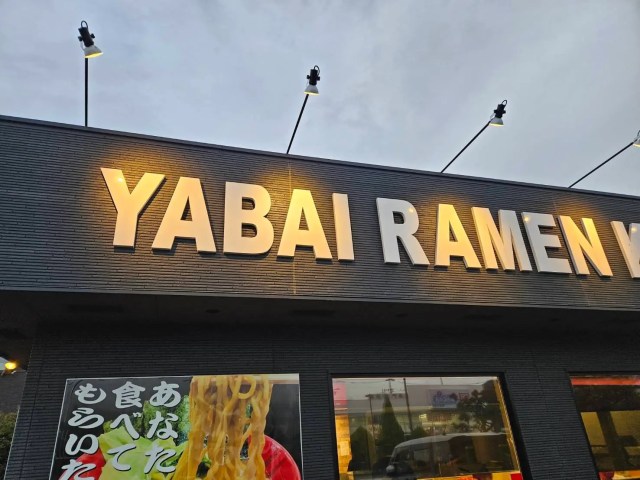
Restaurant uses controversial slang word to sell its noodles, and we find out why.
There are some Japanese words that don’t translate easily into English, and “yabai” is one of them. Though it literally translates as “dangerous“, with roots stemming back to the word “yaba” (“jail cell“), it’s colloquially used in both positive and negative situations these days to express surprise, shock, and wonder, similarly to how we use a phrase like “Oh my God” in the West.
Usually used by young people, who pepper it throughout their conversations, it’s not a formal word commonly seen on giant signs, so when our reporter Takuya Inaba passed by a restaurant with “Yabai Ramen” plastered over it in bold English letters, he knew he had to stop by.
▼ It’s estimated that over 30,000 ramen restaurants exist in Japan, but never before had he seen one like this.
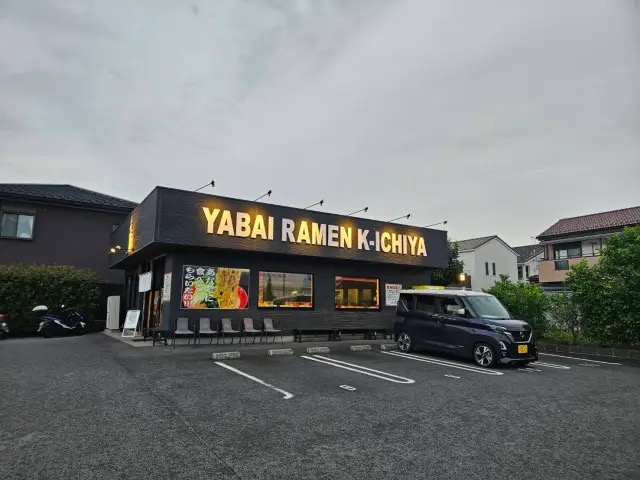
Curious to know if the “yabai” in this restaurant’s name meant the ramen was shockingly bad or shockingly good, Takuya felt an exciting sense of danger as he walked under the dangerous sign.

Stepping through the doors, Takuya was greeted by a warm and inviting modern space, where he learned that the store was a branch of the Keiichiya ramen restaurant chain, which has its headquarters in Odawara City, Kanagawa Prefecture.
▼ The branch Takuya visited was in Kanagawa’s Kaisei town.
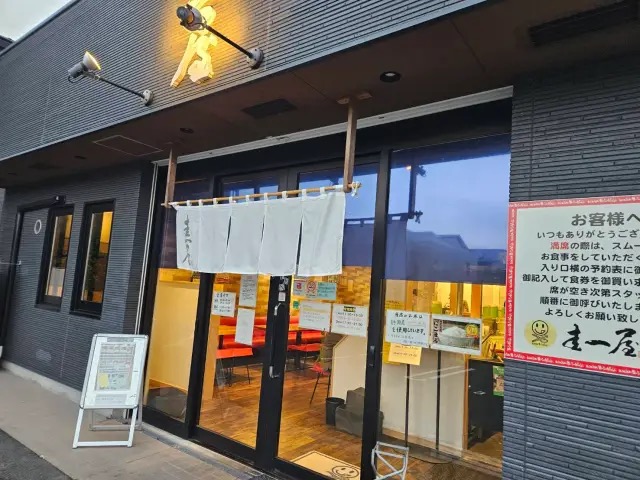
Like most ramen restaurants, this one has a ticket machine by the door where customers place their orders before taking a seat, and when he perused the meals on offer, there was only one natural choice.
▼ The Yabai Ramen (ヤバイラーメン)
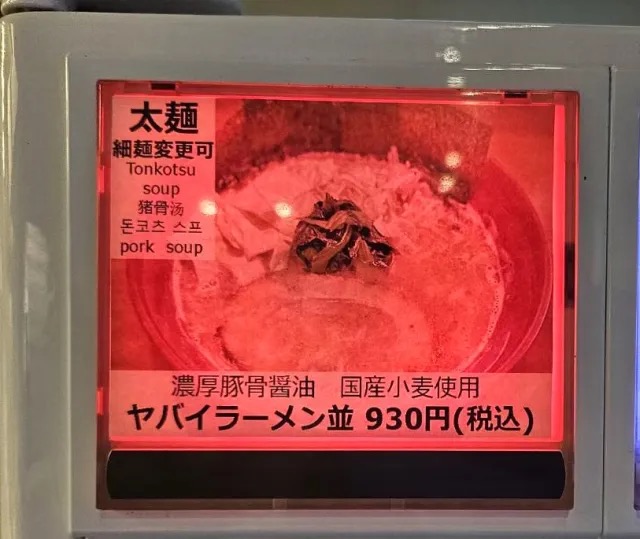
This special dish even had a bright red button to order it, adding to the dangerous vibe of the meal. After adding a seasoned egg for 100 yen (US$0.64), green onions for 50 yen and a side of small rice for 80 yen, the total for the meal came to 1,160 yen.
▼ And when it arrived, it didn’t look dangerous at all!
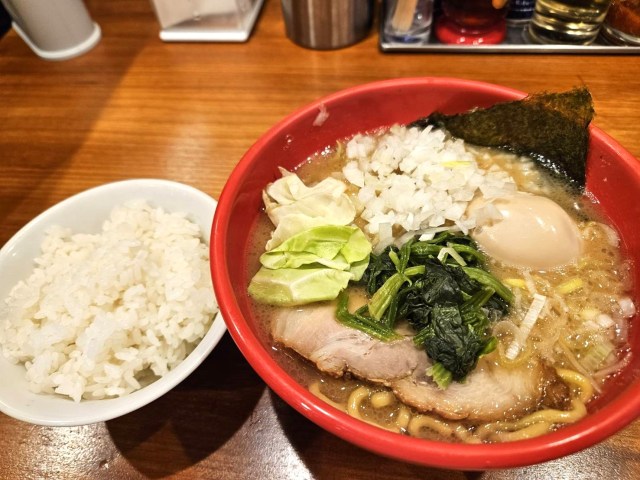
Feeling relieved to see the ramen looking like the familiar iekei ramen he usually enjoys, Takuya figured the yabai element might be concealed within the flavour.
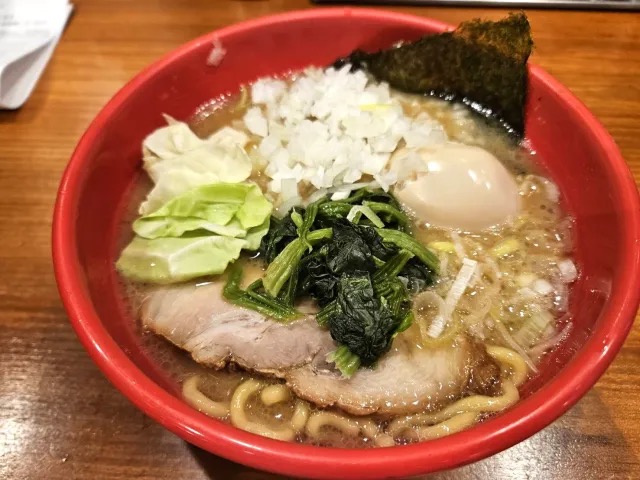
There was only one way to find out — by taking a big slurp to see if the taste of this meal would make Takuya say “yabai” in delight or dismay.
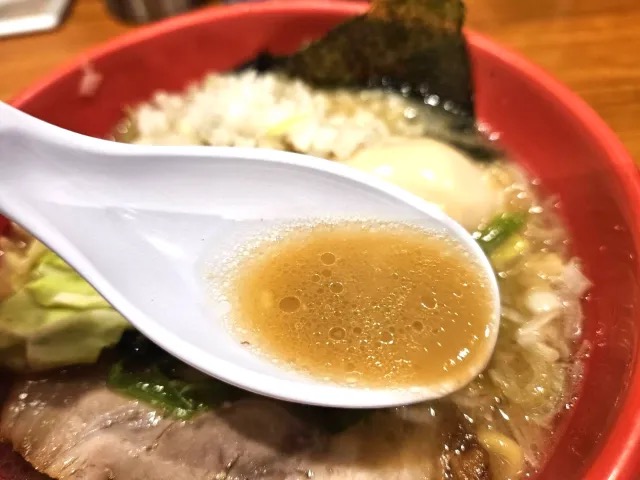
The restaurant certainly wasn’t wrong with its moniker, because Takuya did find himself saying “yabai” after taking a sip. The moment he tasted the broth, it punched him in the face with such a rich, strong flavour that he felt his brain awaken and his eyes pop in surprise.
The only respite came when he bit into the chashu pork and seasoned egg, which were more familiar flavours.
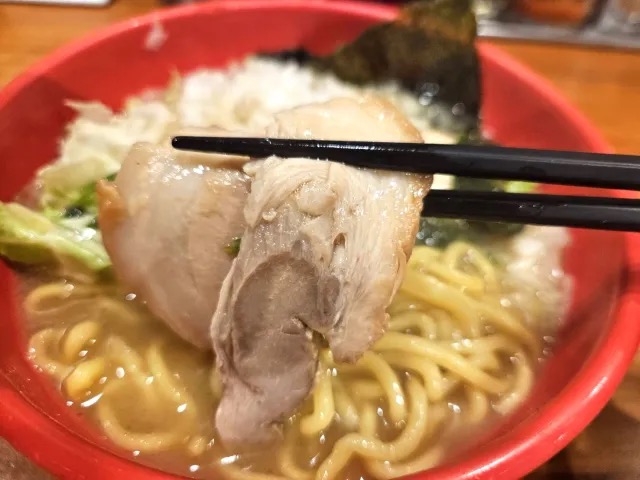
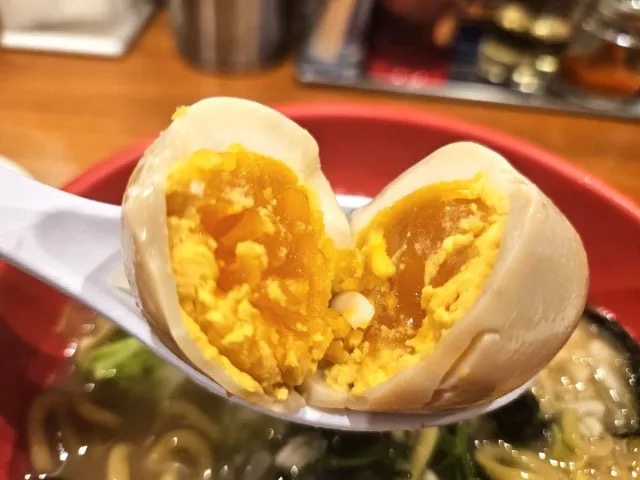
Thankful for the break from the yabai broth, he took a big slurp of the noodles, and found himself silently yelling out “yabai” again.
The noodles were unbelievably chewy with a wonderful texture that was unprecedented. The more he slurped, the more flavourful the noodles became, bringing a huge smile to his face as he ate them.
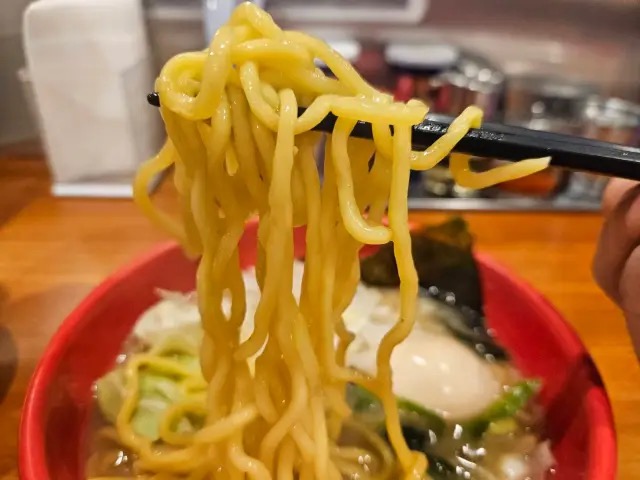
Reading the fine print on the menu, he found that the noodles were made with “Sanuki Kiku”, a flour used for making udon noodles. This helped to give them their unusual chewiness, and Takuya highly recommends trying them at least once, as they have a sensational texture that you won’t find anywhere else.

The food was so good that he kept the feast going with a trio of handmade grilled dumplings for 350 yen. Surprisingly, these were just as chewy as the noodles.
▼ Another yabai moment.
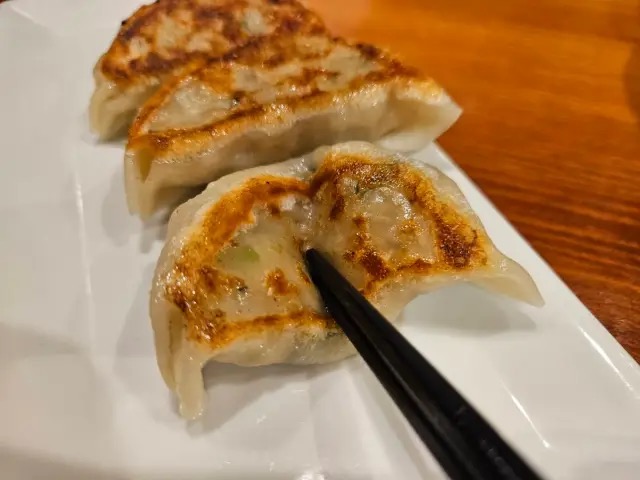
The filling inside was creamy, with an irresistible contrast between the outer and inner components of the dumpling, giving each one a unique flavour and texture.
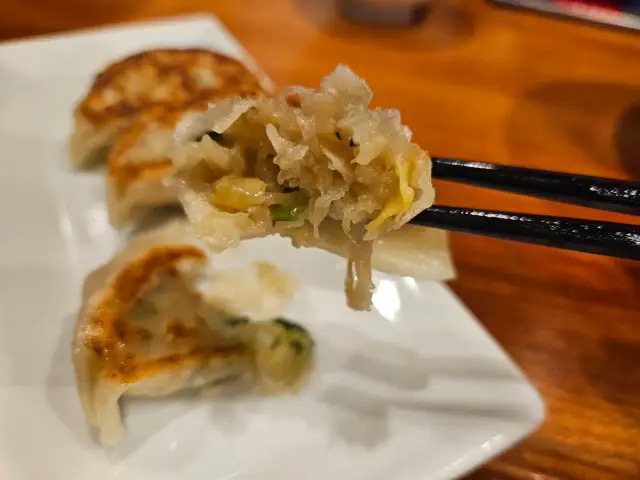
After enjoying some of the gyoza dumplings, Takuya noticed a jar filled with grated garlic on the table, so he grabbed a generous amount of it to add to the noodles.
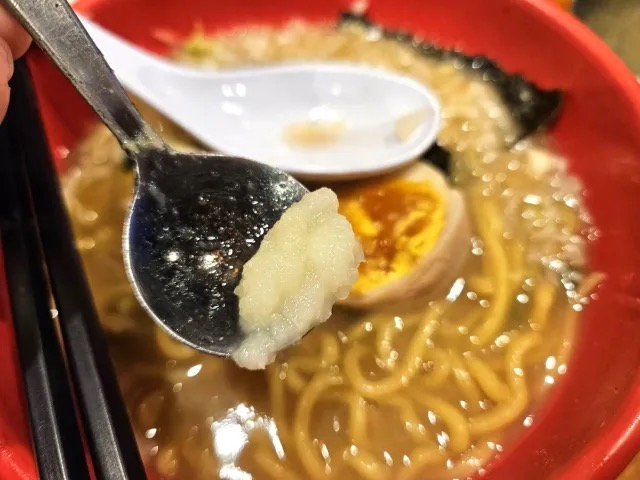
This made for a very nice addition to the rich broth, dialling up the flavour even more and intensifying the partnership with the chewy noodles. The flavours were more than he could’ve imagined, and when he got to the end of the meal the broth juice had fully soaked into the seaweed, creating a concentrated flavour that added further intensity to his side of rice.
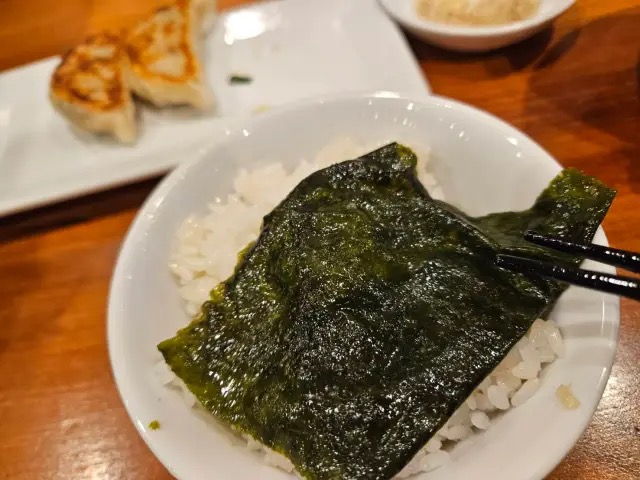
It was a filling meal, and he washed it all down with a glass of cold water, which he drank in one gulp.
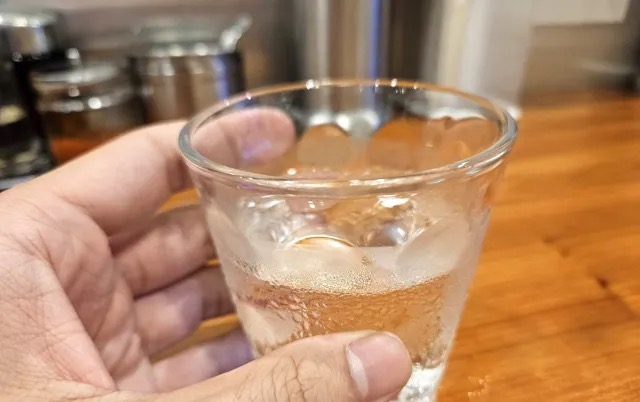
As he sat back and gazed at his empty bowl and plates, he came to a realisation.
▼ This was a great type of yabai ramen.
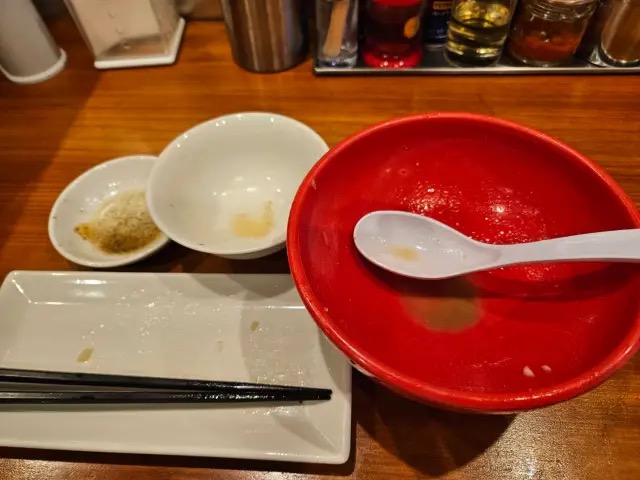
The soup, noodles, toppings and sides…everything had been insanely delicious and totally exceeded his expectations. For Takuya, though, it was the noodles themselves that left him with the biggest sense of yabai.
That got him thinking…what was the backstory behind the “yabai” in the restaurant name?
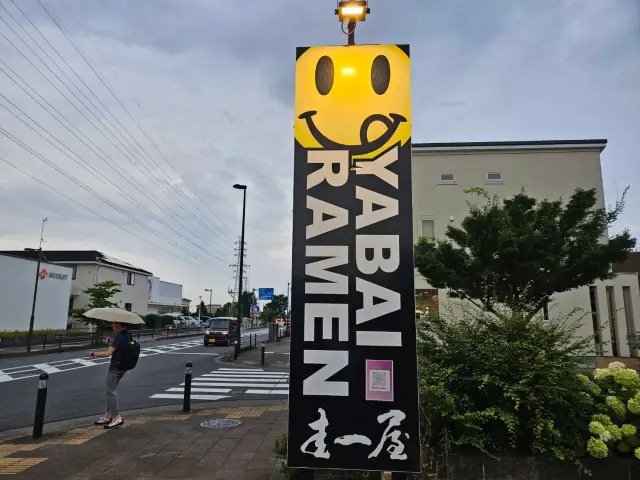
After enquiring with the manager, Takuya discovered that the owner of Keiichiya once trained at an extremely popular restaurant called Shofuku in Shizuoka, where he mastered the technique of noodle making. Shofuku uses the catchphrase “Umai Ramen” (“うまいラーメン”) in its advertising, which is interesting as it’s like the opposite side of the coin to yabai, because it undoubtedly means “delicious”.
Fuelled by a desire to create the most delicious ramen ever, the owner named this restaurant “Yabai Ramen” to reflect his sense of extreme passion for the food. The name certainly does leave an impact, and when Takuya asked why they chose to add “Yabai Ramen” to the sign in English, the manager replied:
“We wanted a sign that would attract people’s attention.”
It certainly caught the eye of our reporter, and doubtless hundreds of others who pass by it, because the first impression it leaves on locals is that a ramen that calls itself yabai must be shocking…in a risky type of way.
We’re happy to report that that’s definitely not the case, though, because yabai ramen is a fantastic ramen that’ll shock your taste buds in a great way. It just goes to show that a word like yabai can be used to describe a lot of things, including ramen. Whether it’s good or bad yabai, though, is up to you!
Restaurant information
Yabai Ramen Keiichiya Kaisei branch / Yabai Ramen 圭一屋 開成店
Address: Kanagawa-ken, Ashigarakami-gun, Kaisei-cho, Minami 4-1-15
神奈川県足柄上郡開成町みなみ4-1-15
Open: 11:30 a.m.– 3:00 p.m.; 5:30 p.m. – 9:00 p.m.
Closed Wednesdays
Website
Photos © SoraNews24
● Want to hear about SoraNews24’s latest articles as soon as they’re published? Follow us on Facebook and Twitter!
[ Read in Japanese ]

 Japanese ramen chain becomes a hot topic with foreigners on Reddit, but is it any good?
Japanese ramen chain becomes a hot topic with foreigners on Reddit, but is it any good? New 55-second cup ramen makes instant noodles more instant
New 55-second cup ramen makes instant noodles more instant Catch! Noodles and bowls fly through the air at this Japanese ramen restaurant
Catch! Noodles and bowls fly through the air at this Japanese ramen restaurant Ramen restaurant in Tokyo offers discount to customers who order ramen with no noodles
Ramen restaurant in Tokyo offers discount to customers who order ramen with no noodles Ramen kaiseki: Japanese restaurant offers first-ever multi-course noodle experience
Ramen kaiseki: Japanese restaurant offers first-ever multi-course noodle experience Studio Ghibli releases new “komorebi” plush toys from Princess Mononoke and Spirited Away
Studio Ghibli releases new “komorebi” plush toys from Princess Mononoke and Spirited Away All Lotteria fast food restaurants in Japan to close by the end of March
All Lotteria fast food restaurants in Japan to close by the end of March Tokyo pub explicitly soft-bans customers older than 39 from entering
Tokyo pub explicitly soft-bans customers older than 39 from entering Pokémon popcorn buckets coming to Japan’s first-ever permanent Pokémon theme park zone
Pokémon popcorn buckets coming to Japan’s first-ever permanent Pokémon theme park zone Starbucks Japan releases new drinkware and goods for Valentine’s Day
Starbucks Japan releases new drinkware and goods for Valentine’s Day Travel through Japanese festivals and tourist sites with this stunning 8K highlight reel 【Video】
Travel through Japanese festivals and tourist sites with this stunning 8K highlight reel 【Video】 Mister Donut releases a secret Godiva doughnut you won’t find in stores
Mister Donut releases a secret Godiva doughnut you won’t find in stores Starbucks celebrates Halloween with new Frappuccino, tea and drinkware in Japan
Starbucks celebrates Halloween with new Frappuccino, tea and drinkware in Japan Gorgeous Sailor Moon princess dresses for all the galas in the galaxy【Photos】
Gorgeous Sailor Moon princess dresses for all the galas in the galaxy【Photos】 Majority of Japanese women in survey regret marrying their husband, but that’s only half the story
Majority of Japanese women in survey regret marrying their husband, but that’s only half the story Japan releases first official sakura cherry blossom forecast for 2026
Japan releases first official sakura cherry blossom forecast for 2026 Visiting Japan’s Gyarados Pokémon park in the city with a special connection to Magikarp【Photos】
Visiting Japan’s Gyarados Pokémon park in the city with a special connection to Magikarp【Photos】 Massive manga collaboration bringing 100 years of Shueisha manga to Uniqlo T-shirts【Photos】
Massive manga collaboration bringing 100 years of Shueisha manga to Uniqlo T-shirts【Photos】 Japan’s kid-friendly ski program is now selling Pikachu snowboards for a limited time only
Japan’s kid-friendly ski program is now selling Pikachu snowboards for a limited time only Totoro cream puffs and Catbus cookies are finally available in downtown Tokyo
Totoro cream puffs and Catbus cookies are finally available in downtown Tokyo Japanese vending machine serves up unique drinks at four Tokyo train stations
Japanese vending machine serves up unique drinks at four Tokyo train stations 10 times to avoid traveling in Japan in 2026
10 times to avoid traveling in Japan in 2026 Starbucks Japan ready to get Year of the Horse started with adorable drinkware and plushies【Pics】
Starbucks Japan ready to get Year of the Horse started with adorable drinkware and plushies【Pics】 Starbucks Japan releases new Frappuccino and latte for Valentine’s Day
Starbucks Japan releases new Frappuccino and latte for Valentine’s Day Our 52-year-old pole dancing reporter shares his tips for achieving your New Year’s exercise goal
Our 52-year-old pole dancing reporter shares his tips for achieving your New Year’s exercise goal Ramen restaurant’s English menu prices are nearly double its Japanese ones, denies discriminating
Ramen restaurant’s English menu prices are nearly double its Japanese ones, denies discriminating Japanese beef bowl chain Sukiya’s 2026 Smile Box lucky bag basically pays for itself
Japanese beef bowl chain Sukiya’s 2026 Smile Box lucky bag basically pays for itself Lacquerware supplier to emperor of Japan and Pokémon team up for new tableware
Lacquerware supplier to emperor of Japan and Pokémon team up for new tableware Survey asks foreign tourists what bothered them in Japan, more than half gave same answer
Survey asks foreign tourists what bothered them in Japan, more than half gave same answer Japan’s human washing machines will go on sale to general public, demos to be held in Tokyo
Japan’s human washing machines will go on sale to general public, demos to be held in Tokyo We deeply regret going into this tunnel on our walk in the mountains of Japan
We deeply regret going into this tunnel on our walk in the mountains of Japan Studio Ghibli releases Kodama forest spirits from Princess Mononoke to light up your home
Studio Ghibli releases Kodama forest spirits from Princess Mononoke to light up your home Major Japanese hotel chain says reservations via overseas booking sites may not be valid
Major Japanese hotel chain says reservations via overseas booking sites may not be valid Put sesame oil in your coffee? Japanese maker says it’s the best way to start your day【Taste test】
Put sesame oil in your coffee? Japanese maker says it’s the best way to start your day【Taste test】 No more using real katana for tourism activities, Japan’s National Police Agency says
No more using real katana for tourism activities, Japan’s National Police Agency says Starbucks Japan reveals new sakura drinkware collection, inspired by evening cherry blossoms
Starbucks Japan reveals new sakura drinkware collection, inspired by evening cherry blossoms Updated cherry blossom forecast shows extra-long sakura season for Japan this year
Updated cherry blossom forecast shows extra-long sakura season for Japan this year Ichiran ramen vs. Ichiran instant ramen: The ultimate taste test right outside the store
Ichiran ramen vs. Ichiran instant ramen: The ultimate taste test right outside the store Clear tonkotsu ramen becomes a cult hit at “Ramen Runway” in Japan
Clear tonkotsu ramen becomes a cult hit at “Ramen Runway” in Japan We eat at Japan’s first-ever ramen restaurant, finally reopened after 44 years
We eat at Japan’s first-ever ramen restaurant, finally reopened after 44 years Sushi Ramen restaurant serves up the best of both worlds in one epic Japanese meal
Sushi Ramen restaurant serves up the best of both worlds in one epic Japanese meal How to make a secret rice bowl at Ichiran ramen
How to make a secret rice bowl at Ichiran ramen $100 ramen in Tokyo: Overpriced or totally worth it?
$100 ramen in Tokyo: Overpriced or totally worth it? Tsukemen ramen restaurant becomes a hit with foreign tourists in Tokyo
Tsukemen ramen restaurant becomes a hit with foreign tourists in Tokyo Japanese ramen chain has some hidden treats on the menu
Japanese ramen chain has some hidden treats on the menu Katsu Curry Ramen: An unusual Japanese dish that combines three great meals in one
Katsu Curry Ramen: An unusual Japanese dish that combines three great meals in one Tokyo restaurant serves up unusual ramen with blue chicken broth
Tokyo restaurant serves up unusual ramen with blue chicken broth Ichiran Ramen’s delicious new product: Fried tonkotsu noodles!
Ichiran Ramen’s delicious new product: Fried tonkotsu noodles! Cup Noodle Mystery Meat is now sold in boxes, so we do what any ramen lover would do with them
Cup Noodle Mystery Meat is now sold in boxes, so we do what any ramen lover would do with them We try the “longest ramen in history”【Taste test】
We try the “longest ramen in history”【Taste test】 Ramen made by a sauna shop opens its doors in Tokyo
Ramen made by a sauna shop opens its doors in Tokyo “Hey, Japanese taxi driver, take us to the best Sano ramen in Sano!”
“Hey, Japanese taxi driver, take us to the best Sano ramen in Sano!” Cappuccino Ramen becomes super popular in Japan, but is it worth the hype?
Cappuccino Ramen becomes super popular in Japan, but is it worth the hype?
Leave a Reply